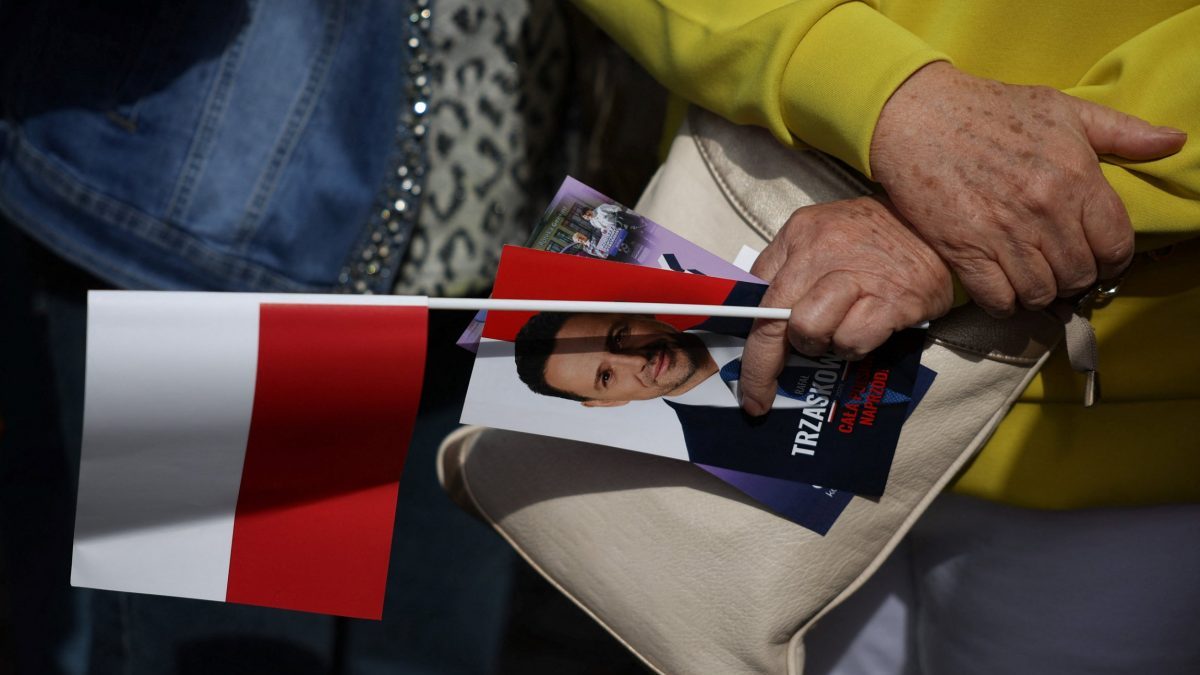The Polish and Romanian presidential elections on Sunday matter more than you think
As Europe tries to hold its centre, two of its most strategically placed nations, Poland and Romania, are veering into political showdowns after enduring corruption scandals, nationalist firebrands, election tampering and just enough foreign intrigue to make Brussels sweat.
On Sunday, voters in both countries will head to the polls for presidential elections that are technically domestic but carry continental implications.
Whether it’s Warsaw or Bucharest, the choice is between pragmatic, if plodding, centrists and populist candidates who wear their Maga hats a little too comfortably. If either of the latter wins, European Union officials will be drawing a deep breath as they brace for a new thorn in the bloc’s side.
Poland is deciding whether to clear the way for centre-right prime minister Donald Tusk’s reform agenda aimed at depoliticising the judiciary or throw a spanner in the works by electing a hard-right president who venerates Donald Trump and has an affinity for alt-history.
Poland’s poll contest
The leading candidates are Warsaw’s cosmopolitan mayor Rafał Trzaskowski, from Tusk’s ruling Civic Coalition (KO), and Karol Nawrocki, a historian with the ultra-conservative Law and Justice party (PiS) and, allegedly, a problematic real estate portfolio.
Trzaskowski has been here before: he narrowly lost the 2020 presidential race to PiS-backed Andrzej Duda. This time, he’s backed by Tusk’s EU-friendly, reform-minded government that has been helping steer the “coalition of the willing“, Ukraine’s most eager European allies, which includes Britain and France.
Nawrocki, meanwhile, is hoping to channel the populism that has become all too familiar in recent years, raging against the establishment and claiming to be the voice of average, downtrodden Poles.
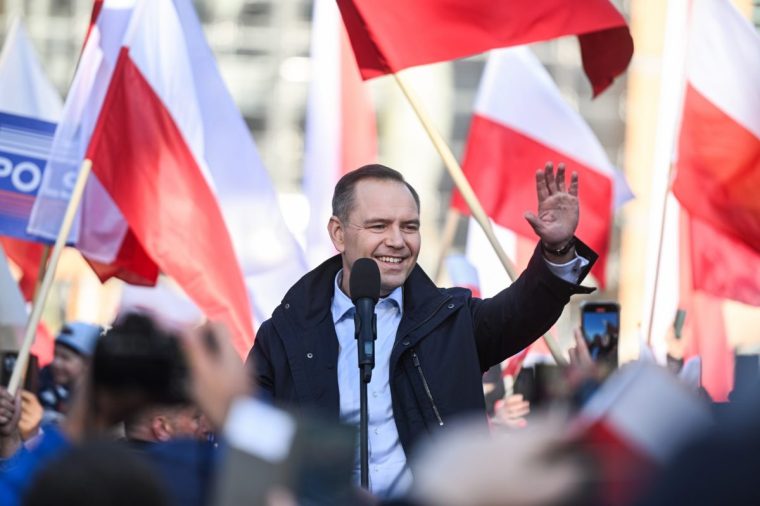 Karol Nawrocki, supported by the Law and Justice Party, at a political rally in Lublin, Poland on Friday. The country goes to the polls to elect its new president on Sunday (Photo: Omar Marques/Getty)
Karol Nawrocki, supported by the Law and Justice Party, at a political rally in Lublin, Poland on Friday. The country goes to the polls to elect its new president on Sunday (Photo: Omar Marques/Getty)
However, his campaign has been plagued by allegations that he defrauded a pensioner who sold him a home, as well as disguising himself as a gangster to praise his own book on TV. His recent trip to Washington resulted in a photo with Trump, who reportedly told him: “You will win!”
The Polish electorate responded with a shrug, and his poll numbers dipped anyway – no poll puts him ahead of Trzaskowski.
For Tusk, a Trzaskowski presidency would be like replacing a rusty lock with a shiny master key. Poland’s president can frustrate the government by rejecting laws, appointing judges and ambassadors, and shaping foreign policy.
Duda, who steps down after a decade as president, has wielded his veto with vigour as he blocks much-needed reforms, particularly of the judiciary and public broadcasting, both of which have been purged of liberals.
“The election outcome could also have profound implications for Europe,” said Marta Prochwicz, from the Warsaw office of the European Council on Foreign Relations. “A Trzaskowski victory would secure Poland as a rising European power committed to strengthening EU integration, defence co-operation and regional stability. Conversely, a Nawrocki win would significantly constrain Warsaw’s European engagement and weaken the EU’s eastern flank.”
Round two in Romania
If Poland’s election is a battle for momentum, Romania’s is more of a cliffhanger packed with plot twists.
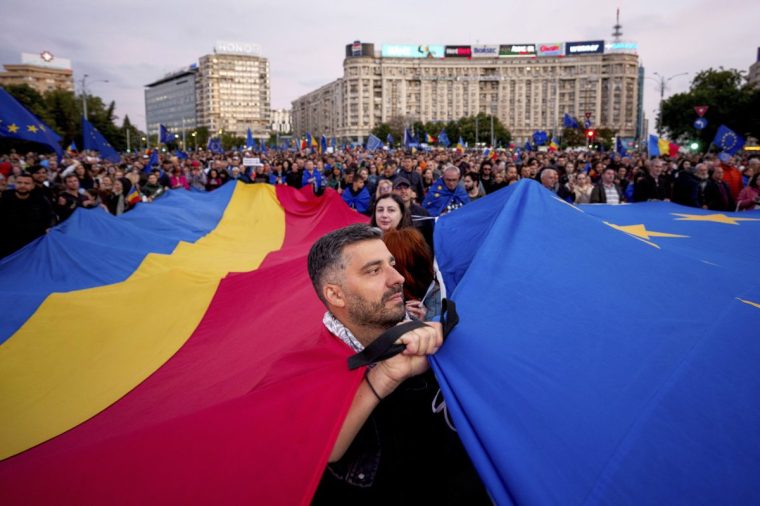 Demonstrators hold large Romanian and EU flags during a pro-EU rally ahead of the second round of the presidential election in Bucharest, Romania on 9 May (Photo: Andreea Alexandru/AP)
Demonstrators hold large Romanian and EU flags during a pro-EU rally ahead of the second round of the presidential election in Bucharest, Romania on 9 May (Photo: Andreea Alexandru/AP)
On one side is Nicușor Dan, the buttoned-up mayor of Bucharest, a Sorbonne-trained mathematician who is seen as incorruptible – a rare quality in Romanian politics – but his love of zoning laws reflects his subdued personality. On the other is George Simion, a bombastic former football hooligan and current leader of the far-right AUR party, who claims to be “Donald Trump’s candidate” – although it’s unclear whether the US President knows or cares.
Simion’s rise has been turbocharged by a perfect storm of disillusionment, internet conspiracy theories, and a botched first-round election last November.
That vote was annulled after it emerged that Russia had interfered in the campaign to support pro-Moscow candidate Calin Georgescu, who was later barred from running again. The election annulment prompted US Vice President JD Vance’s rebuke of Europe in February for curtailing freedom of speech.
Simion stepped in as the replacement and won the re-run’s first round with 41 per cent of the vote – and has promised to trigger early parliamentary elections if he wins and appoint Georgescu as prime minister.
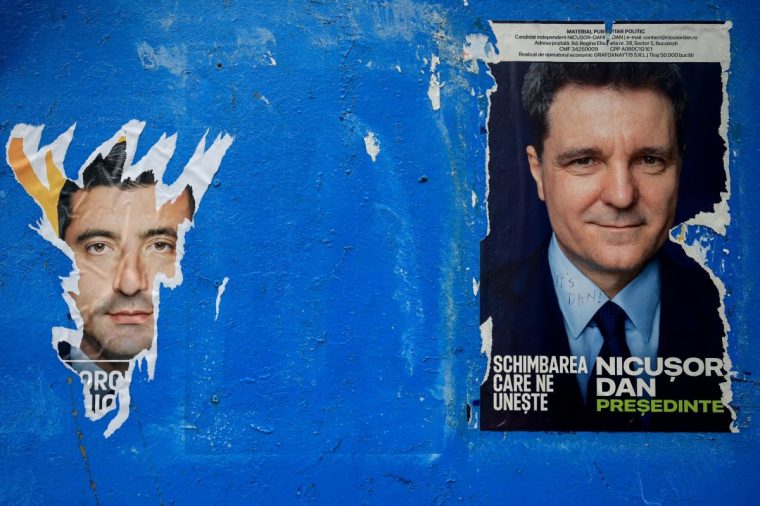 A torn out poster featuring presidential candidate George Simion is seen next to one of Nicusor Dan, with the writing ‘Its Dan’ in Bucharest, Romania (Photo: Louisa Gouliamaki/Reuters)The influence of Putin and Trump
A torn out poster featuring presidential candidate George Simion is seen next to one of Nicusor Dan, with the writing ‘Its Dan’ in Bucharest, Romania (Photo: Louisa Gouliamaki/Reuters)The influence of Putin and Trump
“In this election, Russian influence was amplified by pressure from elements of the Trump-aligned Maga movement to create a window of opportunity for a radical reversal of the country’s democratic course and strategic orientation,” said Oana Popescu-Zamfir, director of GlobalFocus, a Bucharest-based think-tank. “Romania’s presidential election demonstrates what happens when long-festering democratic dysfunction is met by determined foreign manipulation.”
Simion’s views fall somewhere between “nationalist agitator” and “make Romania great again” – and not in a metaphorical sense.
He’s floated annexing Moldova, as well as blocking EU business and expelling foreigners. “EU funds should not go to Ukraine, to anyone other than European citizens, to Romanians and Romanians’ children,” he said recently. “We see Indians, Pakistanis, Bangladeshis on the streets of Romania. Third world citizens come and our citizens leave.” Brussels is understandably nervous. So are the bond markets.
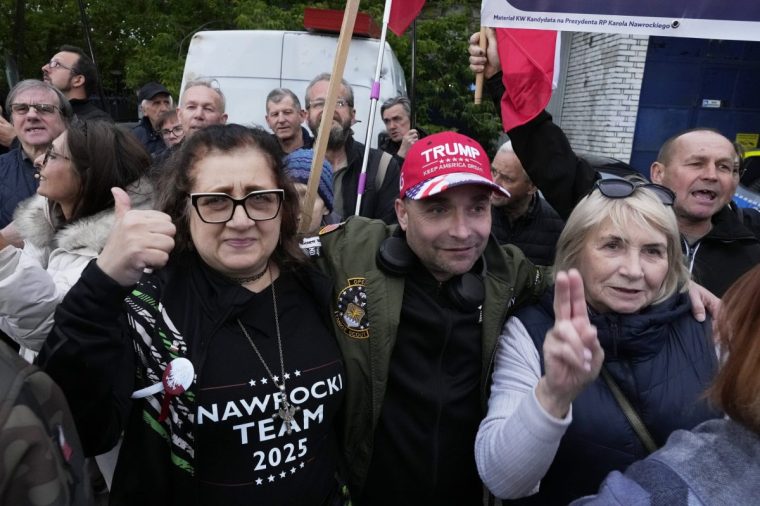 At a Nawrocki presidential election rally in Poland, one supporter wears a Trump cap (Photo: Czarek Sokolowski/AP)
At a Nawrocki presidential election rally in Poland, one supporter wears a Trump cap (Photo: Czarek Sokolowski/AP)
Dan, by contrast, has been campaigning on competence and continuity, promising to keep Romania anchored to the EU and Nato. But he’s starting from behind, and it’s not clear whether Romania’s urbane centrists can outvote the angry masses who see Simion as a sledgehammer to the corrupt status quo. In the first round replay on 4 May, Simion won a stunning 41 per cent of the vote, almost double Dan’s 21 per cent.
The stakes are unusually high. Romania’s president wields real foreign policy clout, not just ribbon-cutting duties. A Simion presidency could see Romania team up with Hungary’s Viktor Orbán and Slovakia’s Robert Fico as part of a populist axis of EU obstruction. Ukraine aid? Don’t count on it. Rule of law? Depends on the definition. Orbán, unsurprisingly, has endorsed Simion, despite the latter’s long history of attacking Romania’s Hungarian minority.
What does it mean for Europe?
Zoom out, and these elections are a stress test for Europe’s ability to keep its eastern flank both stable and aligned. Brussels has been grappling with how to handle member states, particularly those in the east, drifting into illiberalism without alienating voters or accelerating the very trends it fears. So far, it’s been a case of stern letters and frozen funds.
If Trzaskowski and Dan win, the EU breathes easier. Poland remains a rising power under Tusk’s steady, if occasionally self-righteous, leadership. Romania avoids veering off the transatlantic highway and into a pothole of political chaos.
But if Nawrocki and Simion take office, Brussels could be looking at two more seats at the European Council occupied by nationalist naysayers. It would also deepen the perception that Europe is struggling to offer more than technocratic tinkering and moralising tweets in response to growing populist unrest.
The EU, still bruised by Brexit and wary of Trump, needs partners it can rely on. Poland and Romania have been among the most vocal supporters of Ukraine and lynchpins of Nato’s eastern strategy. A shift in either capital could ripple across the continent and be a welcome development for Vladimir Putin.
While Sunday’s ballots may be cast in Warsaw and Bucharest, the consequences could land squarely in Brussels.
